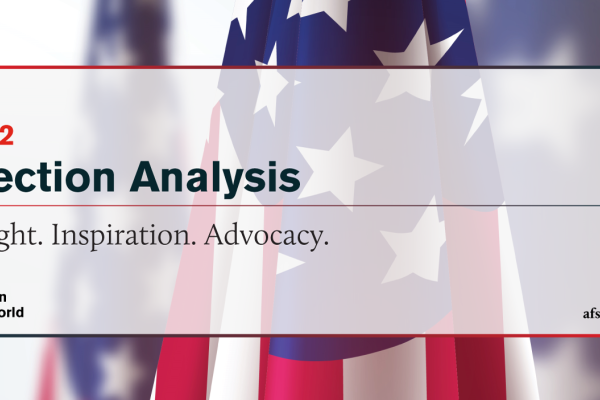Perspectives on National Security
116 total results. Page 1 of 5.

The United States awoke on November 6 to a changed and improbable political landscape. The nation has re-elected Donald J. Trump as President and has given him a US Senate Republican majority and potentially a US House of Representatives Republican majority as well. As fatigued and steadfast local and state election workers continue to sort through ballots, we continue to look to the finalization of tallies for some remaining Senate and House races to determine the nature and size of Congressional majorities.

Welcome to the September 2024 issue of “As the (Customs and Trade) World Turns,” our monthly newsletter where we compile essential updates from the customs and trade world over the past month.
Welcome to the August 2024 issue of “As the (Customs and Trade) World Turns,” our monthly newsletter where we compile essential updates from the customs and trade world over the past month.
On July 29, the Directorate of Defense Trade Controls (DDTC) of the US Department of State proposed a new definition of the term “defense service.”
On July 29, the US government proposed big changes to rules about supporting or exporting to foreign military, intelligence, and security entities.
Welcome to the July 2024 issue of “As the (Customs and Trade) World Turns,” our monthly newsletter where we compile essential updates from the customs and trade world over the past month.
Three US agencies – the US Department of Commerce, Bureau of Industry and Security (BIS), the US Department of the Treasury, Office of Foreign Assets Control (OFAC), and the US Department of State – took new actions on June 11.
The US Senate’s Bipartisan AI Policy Roadmap is a highly anticipated document expected to shape the future of artificial intelligence (AI) in the United States over the next decade.
Senator Doug Jones and Gene Magidenko will present at the FBA’s Corporate and Association Counsel Division webinar on May 16, 2024.
We love it when the US Government actually makes life easier for US exporters. What happened?
License Exception MED, published by the US Department of Commerce’s Bureau of Industry and Security (BIS) on April 25, authorizes the export, reexport, or in-country transfer of EAR99 “medical devices” to non-military hospitals but comes with new restrictions and due diligence requirements.
Hidden in the supplemental emergency appropriation bill (containing support for Israel and Ukraine) that President Biden signed on April 24 is a provision extending the current five-year SoL under the International Emergency Economic Powers Act (IEEPA) and the Trading with the Enemy Act to 10 years.
In an effort to give the Committee on Foreign Investment in the United States (CFIUS) more “bite,” yesterday the Committee published a Notice of Proposed Rulemaking (NRPM) in the Federal Register to enhance its procedures and strengthen its penalty and enforcement authorities.
Two years after the start of Russia’s war in Ukraine and one week after the death of opposition politician and anticorruption activist Aleksey Navalny, the US government announced a new raft of sanctions and export controls targeting nearly 600 individuals and entities.
On January 25, almost two years after Russia’s further invasion of Ukraine, the US Department of Commerce, Bureau of Industry and Security (BIS) issued a final rule (the Rule) strengthening existing export controls relating to Russia, Belarus, and Iran.
Kay Georgi discusses new BIS rules at the Canadian Institute’s 13th Annual Forum on US Export & Re-Export Compliance for Canadian Operations.
On October 30, 2023, President Biden issued an expansive Executive Order (EO) on the Safe, Secure, and Trustworthy Development and Use of Artificial Intelligence (AI), aiming to establish standards for AI technology to address related potential benefits and risks.
Every year, thousands of applications are filed with the Federal Communications Commission (FCC) by defense contractors and equipment manufacturers seeking approval for experimental wireless operations in support of National Security objectives.
Every year, thousands of applications are filed with the Federal Communications Commission (FCC) by defense contractors and equipment manufacturers seeking approval for experimental wireless operations in support of National Security objectives.
Just in case you were starting to get comfortable with last year’s massive raft of regulations on the advanced computing, supercomputer, and semiconductor industries in China, the US Department of Commerce, Bureau of Industry and Security (BIS) has dropped another 400-something pages.
During the G7 meeting in Japan on May 19, 2023, the US Department of Commerce’s Bureau of Industry and Security (BIS) published two new rules aimed at further restricting Russia’s ability to obtain items needed to support its war efforts against Ukraine.
Once again, in the third such decision in fewer than two years, the US Court of Federal Claims (CFC) in January issued a decision granting a protest of, and thereby upending, a major Department of Defense (DoD) award decision.
On Friday, February 24, 2023, on the one-year anniversary of Russia’s further invasion into Ukraine, President Biden, the Office of the US Trade Representative (USTR) and the US Department of Commerce, Bureau of Industry and Security (BIS) imposed duties relating to Russia.
On Friday, February 24, the one-year anniversary of Russia’s further invasion into Ukraine, President Biden, the Office of Foreign Assets Control (OFAC), the US Department of State, and the US Department of Commerce, Bureau of Industry and Security (BIS) imposed new sanctions.

Americans woke up on Wednesday, November 9, immediately realizing something was different. On their televisions and other devices, they only saw commercials for products, vacation spots, and reality shows.